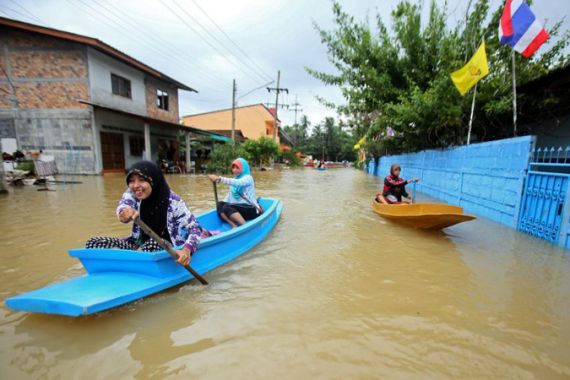Floods hit Thailand and Malaysia
More than 20,000 people evacuated from their homes as torrential rains lead to flooding across the Malay Peninsula

Parts of southern Thailand and northern Malaysia have experienced severe flooding in recent days after heavy rains hit the region. Despite mass evacuations, at least four people are known to have died so far.
The daily rainfall totals across the south of Thailand have been in excess of 50mm for the last few weeks. On Monday, Pattani recorded 84mm of rain whilst Hat Yai had 92mm. The floodwaters now stand waist-deep or higher in many areas.
Keep reading
list of 4 itemsThe Final Breath
Malaysia plans ‘orangutan diplomacy’ in palm oil pitch
Photos: Sustainable living gives Hungarian families hope for the future
The flooding has been in place now for many days in Narathiwat province in southern Thailand. According to the provincial governor, Natthaphong Sirichana, the floods are likely to continue into the new year, and there is the potential for flash floods over the entire province.
South of the border, torrential rains in the northeastern Malay peninsula continue to fall. The state of Kelantan is suffering what has been dubbed the worst flooding in the past decade.
One local resident declared ‘in all my years, this is the first time I’ve had to come to an evacuation centre.’ Another added ‘my whole house was submerged. I don’t even want to go home.’
More than 20,000 have been affected. Water levels did recede in some parts of the state over the weekend but other areas remain inundated.
Some residents have been using boats to reach their homes. A little further south, Kuantan, the state capital of Pahang recorded 103mm of rain in 24 hours.
Not too far away, North Aceh, which is located in the far north of Sumatra, recorded 125mm of rain on Monday. This is of course a wet part of the world but this equates to just over half the December average in just 24 hours.
The northeasterly trade winds are expected to feed more rain clouds across the area and the floods do look set to worsen with wetter weather predicted over the next few days. High tides are likely to exacerbate this situation.